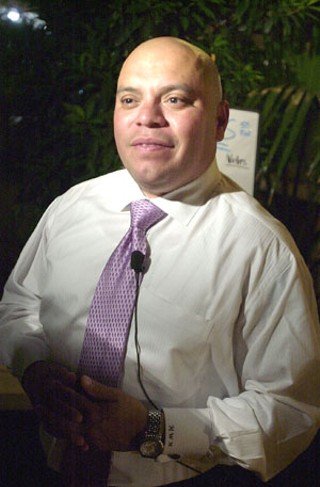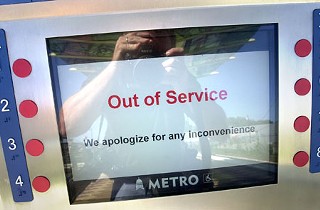What's Wrong With Cap Metro ... and What's Right
The transit agency is good at a few things – like digging itself into a public relations ditch
By Lee Nichols, Fri., April 24, 2009
To say that the month of March went poorly for Capital Metro is putting it mildly.
In midmonth, after already a half-year's delay, the agency announced that its new MetroRail commuter rail line would not meet its planned March 30 launch date due to a labor subcontractor's violation of Federal Railroad Administration safety rules. Rail service would finally begin about a month later, the agency said.
That disappointment was followed by a financial scandal – sort of – when the Austin American-Statesman, employing the kind of screaming headlines we've come to expect from the daily, ran an alarming news feature about a "spending blitz" that had burned through the agency's monetary reserves while it still owes the city of Austin and other entities millions of dollars.
And Cap Metro's problems reached full boil when it was announced that the FRA had filed even more allegations against the labor contractor, Veolia Transportation, which was responsible – maybe – for yet another MetroRail launch delay, this time indefinitely. (Cap Metro is now scheduled to give a progress report to the community on May 15 – we'll see.)
If all of that weren't enough, Cap Metro was still attempting to heal its black eye from a strike by drivers and maintenance workers just four months earlier. By the time April finally rolled around, Austinites had to wonder: Who's driving this train?
Fingers Pointed Elsewhere
As is often the case with governmental and quasi-governmental agencies, that's a simple question with a complex answer. Overseeing all transportation policy in Central Texas is the Capital Area Metropolitan Planning Organization, composed of regional elected officials. More directly governing the transit agency is Cap Metro's board of directors, also a combination of elected officials plus two CAMPO appointees. But running the day-to-day operations – at least ostensibly – is Cap Metro's president and CEO, Fred Gilliam.
I would have loved to get Gilliam on the record for this story. I wish we had his words in print to defend his and his agency's actions. But at least three interview requests, for this article and previous ones, have been answered by his lieutenants. To anyone trying to peek into Cap Metro's world, Gilliam remains an enigma. And that leaves him exposed to criticisms such as this one: "The buck stops with Fred Gilliam, period, in terms of employees at Cap Metro," says Austin City Council Member Mike Martinez, a board member. "The buck ultimately stops with the board, and I absolutely accept my responsibility as a board member for any issues the agency is plagued with. But when I see press releases come out of Cap Metro saying, 'We've demanded that Veolia fire their safety director,' that is not a leadership position. Especially when, several hours prior to that press release, Veolia had already agreed to replace its safety director, via conversations with Cap Metro."
Martinez seethes at the persistent agency bungling. The Cap Metro press release to which he refers placed most of the blame on Veolia, a French-owned company that manages transit workers for agencies around the U.S. Martinez told the Statesman he agrees with the decision to delay MetroRail's launch but that Veolia has been made a "scapegoat." The initial problems with the Federal Railroad Administration involved a couple of train operators moving their rail cars into unauthorized sections of track, and the second delay followed additional FRA complaints, mostly over paperwork involving things like hearing and vision testing.
"There are other, more severe safety concerns that I think we have to address and work on before we open the rail line," Martinez told me. Specifically, a problem that doesn't involve Veolia and which wasn't mentioned in the "indefinite delay" press release: As of March 20 (the date of the release), the crossing barrier systems at 19 of the 55 road/rail crossings along the 32-mile route were not fully functioning. "Our crossing guard arms, the timing is still needing to be worked out," Martinez said. "Sometimes the gates come down; sometimes they don't." The crossing gate system is new (at least to the Austin area), and it's engineered to synchronize with traffic lights to allow automobiles to clear the tracks as the train approaches.
Asked to elaborate on the status of the problem, Cap Metro spokesman Adam Shaivitz said that a process of "grinding and polishing" the rails, which is being performed this week, should correct the situation by removing rust and other buildup that can interfere with the shunting system that signals the crossing guards that a train is coming (as well as transmitting the train's precise location to dispatchers). Presumably, that process should allow the agency to move forward on an opening schedule for the system.
Wherever the fault lies, Martinez doesn't like the way it's been handled: "To send [agency PR specialists] Adam Shaivitz and Misty Whited out to be the face and voice of Capital Metro in some of our most difficult times is inappropriate – because, as a board member, I speak freely in my interviews, and I don't think it's fair for a reporter to have to go over to Cap Metro and ask Adam Shaivitz, 'What do you think about board member Martinez's statement?' That's totally inappropriate. The leaders of the organization should be the ones speaking for Cap Metro.

"We have so many great staff members at Cap Metro who have worked so hard to get rail up and running," Martinez concluded. "And then because of the mistakes of a few, and incompetency of a few, the entire organization takes a massive hit publicly. ... I can't even imagine how frustrating it is to some of our employees who have been busting their asses for years to get this thing up and running, and then in one fell swoop, in a 24-hour period, we go back 10 years in terms of trust and community support."
Martinez isn't alone in his anger. "I'm pretty pissed off about this whole thing," says state Rep. Eddie Rodriguez, a member of the CAMPO board. Martinez and Rodriguez were both angry that, after the delay from March 30 was announced, Cap Metro had still intended to go ahead with planned launch parties on March 28 (the agency managers eventually came to their senses and canceled the celebrations). "Whenever this grand opening really does happen, I can tell you who's not going to be there, and that's going to be me," says Rodriguez. "I have to see this thing start and see it work before I can get behind Capital Metro when it comes to the rail project. For too long I've been singing their praises and how rail's really going to benefit the city and how it's going to be a success, and now I just feel like I need to see it before I get up anywhere and applaud it. As long as Capital Metro is going to be running the rail, I need to see some proof that they're doing their job right."
"You have to look at the top of the leadership there," Rodriguez said of Gilliam, echoing Martinez. "Whether he's completely to blame, I cannot say, because I'm not in on the daily workings of that agency. But what upset me in this most recent deal is this: Veolia was thrown onto the tracks, so to speak. ... The leader of that agency needs to stand up and say, 'This is how we screwed up and how we're going to fix it.' The fact that Fred hasn't stood up and said anything to that effect is really upsetting to me."
Veolia executives, for their part, note that most of the inspection items on which the FRA had a complaint were not at a level that would prompt the FRA to pursue violation sanctions; most involved paperwork problems that have since been "mitigated." As for whether they've been made a "scapegoat," Veolia's local general manager, Gord Ryan, said, "We're trying to work in partnership with them, and Capital Metro appreciates that." Added George Elsmore, Veolia's vice president for rail safety and compliance, "It's of no benefit to point fingers."
Going Bankrupt? Not Really.
Adding to the agency's problems is a daily newspaper that seems determined to pile on, making things appear even worse than they really are. (One can almost imagine someone at Cap Metro saying, "We're screwing this up just fine on our own, thank you.") On March 15, for instance, Statesman transportation reporter Ben Wear ran a scathing feature depicting an agency in financial crisis.
But when the dust settled – as happens with too many trumpeted Statesman exposés – there turned out to be more smoke than fire. (Regrettably, we at the Chronicle bit on that bait before critically examining it; see "Cap Metro," by none other than yours truly, March 27). Wear's central thesis: The agency spent years building up a $200 million savings account and then went on a $299 million "spending blitz" (a frivolous one, presumably, even though the spending was on capital projects that actually serve Cap Metro customers) that left its reserves "depleted" while it still owes the city of Austin and other entities $85 million to $110 million for various transportation projects. (The savings had dropped to $44 million, just above the $38 million safety cushion the agency must maintain.)
Cap Metro owes the city that money under an interlocal agreement that, out of the 1 cent in sales-tax receipts that the transit agency receives, returns one-fourth of a cent to Austin for projects aiding regional mobility. Left completely unmentioned in the Statesman story: The agreement allows payment of the money "as funds are available" and says, "Each party shall be excused for failures and delays in the performance of its respective obligations under this Agreement due to any cause beyond the control and without the fault of such party." The potential allowable causes listed do not specifically include unforeseen fuel-price spikes or massive financial meltdowns in the world economy, but the agreement does say possible excuses are not limited to the "acts of God, war, riot," etc. that are expressly enumerated.
Of course, as it always does after its reporters uncover supposed malfeasance by somebody about something, the more thoroughly incompetent Statesman editorial board had to add its two cents. Continuing their tradition of (to borrow the words of current mayoral candidate Lee Leffingwell) "fact-free editorials," the Statesman editors denounced the $299 million in spending as "more than the agency generated in income" in the 2002-08 period.

This time, rather than timidly take its beating without protest, Cap Metro responded politely but firmly. Cap Metro's executive vice president in charge of finance and administration, Randy Hume, posted a response on the agency's website asserting that "recent media coverage did not present a full picture of this complicated but critically important issue." Among other points, Hume noted that "Capital Metro is current with all its financial obligations," the agency had been forecasting a spend-down of the reserves since 2006, the agency still has payments budgeted into its spending going forward, and some of the payment moneys under scrutiny don't come due until 2013. In addition, Hume told me, the editorial's assertion of deficit spending is "totally false" – in fact, he said, Cap Metro's tax revenues over the 2002-08 period totaled $783 million.
This isn't to say Wear's reporting was without merit. Martinez described it as "accurate, but it needed context." Travis Co. commissioner and Capital Metro board Chair Margaret Gomez criticized the story as "not quite accurate" but added: "What I thought was very good about the article was that it enumerated a list of the projects [underwritten by the Cap Metro money]. It was all stuff that our customers wanted."
Hume and another VP, Chief Development Officer Doug Allen, admit they do have regrets about the spending: "The reserves went down faster than we expected," Allen said, but Cap Metro was caught off guard by the drop in sales taxes and rise in fuel costs, as well as federal funding that disappeared when "earmarks became a bad word." "We should have reacted faster, but we're still solvent," said Hume. (It's also worth noting that Cap Metro continues to hold a AAA bond rating.)
Changes at the Top?
From the department of small comfort: Although we didn't find any enthusiastic cheerleaders for Fred Gilliam, not everyone was quite so willing to bash him. Asked if Gilliam bears responsibility for Cap Metro's current predicament, Gomez charitably replied, "All of us do." City Council member, Cap Metro board member, and current mayoral candidate Brewster McCracken delivered a tepid endorsement: "I appreciate Fred's service," followed by an awkward, "He's nearing retirement." McCracken's opponent Leffingwell, who has also been on the Cap Metro board, was a good deal more blunt: "Fred Gilliam should go." Glenn Gadbois of the Alliance for Public Transportation, a civic leadership group supporting regional mass transit, insisted that although the problems are frustrating, Gilliam is "a good man." (Gadbois' endorsement is in stark contrast with Amalgamated Transit Union Local 1091 President Jay Wyatt, the leader of the November strike, who pounds Gilliam relentlessly, even suggesting that the agency's problems are not simply incompetence but reflect actual malfeasance. Wyatt has repeatedly called for an independent, outside audit of the agency, and Cap Metro has responded by requesting one from the State Auditor's Office; on April 14, the office said it "will consider" such an audit in September. But Cap Metro's labor difficulties can fill – and have – an entirely separate article.)
The persistent scuttlebutt around Cap Metro has been that Gilliam will step down once rail is up and running. If that day ever finally comes, it would be a comfortable occasion for a change in leadership. But other changes might be in the wind as well.
Lege to the Rescue
As chairman of CAMPO, Kirk Watson can apply only so much indirect pressure for management and staff changes. But as a state senator, he can attempt to address the level above that – Cap Metro's board. In February, he began casting about for ideas on how to reform the agency, an effort that coalesced last month into his Senate Bill 2015 (see "Senate Bill 2015: Major Provisions," below). It might be hard to recall, but a decade ago, Cap Metro was in such disarray that the current organization sparkles by comparison. As Watson put it when he announced his bill, "In 1997, Capital Metro was a disgrace to our community." So the Legislature stepped in and made a number of changes, including changing the board from a group of appointed members to mostly elected officials, to bring the agency greater public accountability.
Those reforms had a positive effect, but Watson thinks they've now outlived their usefulness. While Watson says there is "no question" that Gilliam bears responsibility for the recent problems, his legislation aims above Gilliam. He seeks to change the board structure yet again and hopes to untie the agency's hands on extending rail service.
The latter proposal might make some cringe, given that Cap Metro can't even seem to get rail started, but it would simply allow the agency to extend by "not more than one mile of track" an already approved system, and it would allow Cap Metro to contract out to operate a rail system owned by another entity (e.g., a nonmember city such as Round Rock) without holding a referendum. Under current state law, Watson laments, "Capital Metro can't sneeze without holding an election."
Under Watson's bill, the board structure would largely return to an appointment system, although some seats would remain elected officials; Austin, as by far the largest participant and underwriter, would get a larger say in the appointments. What the board would lose in elected officials it would hopefully gain in knowledge. Some current board members complained to the Statesman that they didn't fully understand the financial picture presented to them; SB 2015 would require that one CAMPO-appointed member would have no less than 10 years' experience working as a financial or accounting professional and another would have worked at least 10 years in an executive-level role in a public or private organization.
"My goal is not to criticize, berate, or attack [Capital Metro]," Watson says. "My goal is to serve as a means to assure improvement and high functioning. ... We need some specificity of expertise. That's not a criticism but a response of how to make the board more accountable." By some accounts, that would be welcome by board members themselves – Gadbois says he's heard some complain that they've had to study board agendas while being driven to meetings.
Watson's bill easily passed the Senate on April 7, but neither it nor Rodriguez's companion bill have yet been taken up in the Texas House, and with everyone acknowledging that the current legislative session is woefully behind schedule, its chances of becoming law are sketchy.
The Buses Run on Time
So what, if anything, is Capital Metro doing right?
A more precise question might be, underneath all the headline smoke and undeniable management problems: How is the agency actually performing? The honest answer is somewhat incomplete but potentially encouraging: Within the scope of its historical mission, pretty well, actually. But the mission itself needs a contemporary upgrade.
A 2007-08 peer review, prepared by the Austin office of the transportation consultant firm Cambridge Systematics, found that on many fronts, the agency compares quite well to similar transit systems, such as those in Kansas City, Mo.; Charlotte, N.C.; Sacramento, Calif.; and others. In brief, the review concluded, Capital Metro runs a good bus company. On an anecdotal level, I can testify to that personally. I ride Cap Metro's buses almost daily. They generally get me where I want to go. There are times when the bus won't cut it, and I'm forced to set aside my stubborn support for mass transit and take the car, but more often, the agency gets me around town in a timely fashion. And indeed, the peer review notes that on-time performance (within five minutes of schedule) has risen from 82% to 90% since 2000.
That's good and to be applauded. But it's simply no longer enough. Austin has evolved into a truly major metropolitan area – it's still right in the middle of that process, actually – and needs its transportation system to keep up. "We have a bus company that's working, but we need more than a bus company right now," says Rodriguez. "We deserve more than a bus company, and that's all that we're getting right now."
Board member Martinez suggests the direction that the agency needs to move, with more than all deliberate speed. The promise of a real, comprehensive mass transit system – that links the region together and also establishes effective connections between rail, bus, trolley, bicycles, etc. – has been in the air seemingly forever, and it is long past time to deliver on that promise.
"I do think we need to turn the agency around," concludes Martinez. "I think we need somebody that can evolve the agency into what we're all hoping it becomes, a true multimodal, regional transit system. I daresay, maybe Cap Metro has outlived its usefulness, and maybe it's time for the next step, the next evolution, which would be a broader, more comprehensive transit authority, with more comprehensive leadership."
Capital Metro Board of Directors

Fred Gilliam (r) (president/CEO)
Margaret Gomez (chair), Travis Co. commissioner
Jamie Jatzlau (vice chair), Manor City Council
John Cowman, Leander Mayor
Mike Martinez, Austin City Council
Brewster McCracken, Austin City Council
Mike Manor (secretary), CAMPO
John Trevino, CAMPO
Gina Estrada (executive assistant/board liaison)
One-Car Parade: Cap Metro in a nutshell
How Capital Metro Got Where It Is
• Nov. 5-7: Capital Metro drivers and maintenance workers strike; local officials broker settlement.
• March 13: Cap Metro announces March 30 MetroRail launch date will be delayed "about a month" after the Federal Railroad Administration expresses concerns about Veolia workers moving train into an unauthorized section of track.
• March 15: Austin American-Statesman reports "spending blitz" has drained Cap Metro's savings – Cap Metro responds that spending was transit-related and that its books are in order.
• March 20: Cap Metro announces more FRA allegations against Veolia, and rail is suspended "indefinitely." Unannounced: Nineteen of 55 railroad crossing gates aren't functioning properly.
What's Next?
• Cap Metro management "will report back to the community with the status of the project and an action plan" on May 15.
• Kirk Watson's Cap Metro reform bill (Senate Bill 2015) must make its way through the House and into law by the end of the 81st legislative session on June 1. It has already passed the Senate, but a House bottleneck makes final passage uncertain.
• In September, the State Auditor's Office "will consider" a request by Cap Metro for an independent audit of the agency.
Senate Bill 2015 Major Provisions
• No public referendum is necessary to expand MetroRail if the addition is 1 mile or less.
• No referendum is necessary for Capital Metro to contract to operate a rail system for another entity (such as nonmember cities like Round Rock).
• Seven-member board makeup would change to:
1) One elected official appointed by CAMPO.
2) One CAMPO appointee "who has at least 10 years of experience as a financial or accounting professional."
3) One CAMPO appointee "who has at least 10 years of experience in an executive-level position in a public or private organization."
4) One elected official appointed by the Austin City Council.
5) One member jointly appointed by the Austin City Council and Travis County Commissioners Court.
6) One member jointly appointed by the Austin City Council and Williamson County Commissioners Court.
7) One elected official appointed by a panel composed of mayors of Capital Metro member cities, except Austin, and county commissioners representing precincts having unincorporated areas in Capital Metro's service area.
Got something to say on the subject? Send a letter to the editor.












